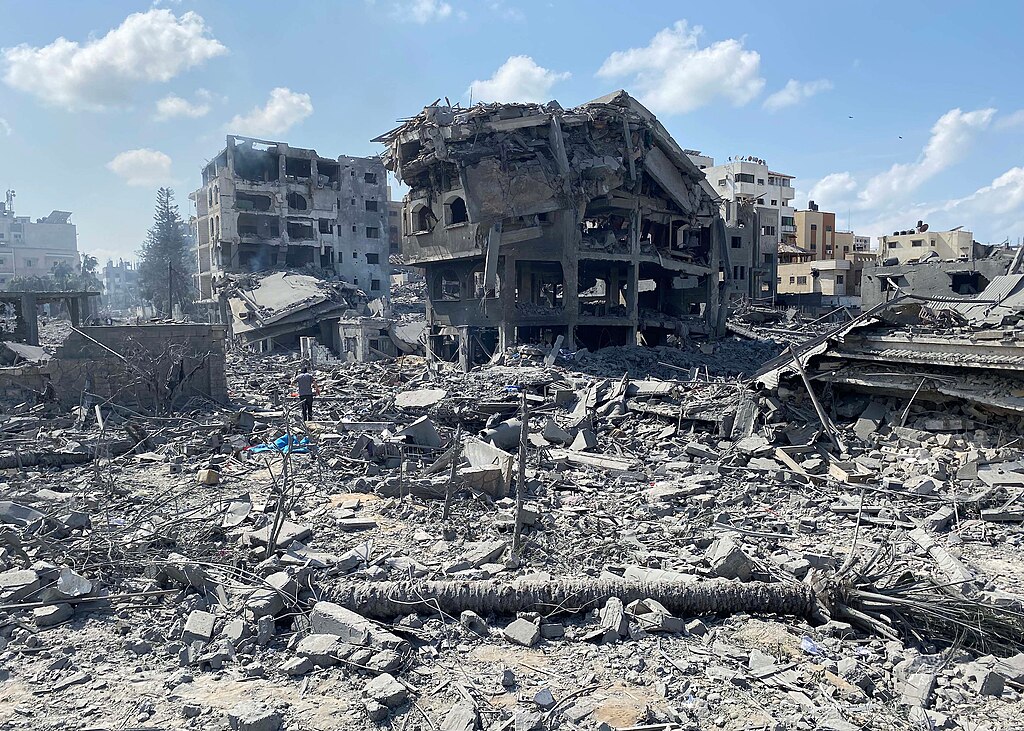Case EGP-FE 270307
The Housing and Land Rights Network (HLRN), part of Habitat International Coalition (HIC), in cooperation with its local member, the Egyptian Centre for Human Rights (ECHR), have received disturbing news about recent evictions in Egypt and request your *URGENT* intervention.
Brief description of the situation
The Egyptian security forces, under the auspices of the Ministry of Interior, attacked the local residents of Qal`at al-Kabsh, an informal housing settlement in the Cairo district of Zainhum, on 22 March 2007 with tear gas bombs in an effort to force the residents to leave the remnants of their homes.
These events took place two days after a fire broke out in the area on 20 March 2007, destroying over 350 homes. Not having been provided with alternative shelter or compensation, the victims of the fire were left with no choice but to sleep on the streets. In an attempt to gain government assistance, the residents of Qal`at al-Kabsh demonstrated in front of Parliament on 21 March 2007. The residents demanded from local
authorities to provide them with alternative housing after the fire destroyed their homes and belongings.
The Governor of Cairo. Abd ul-Athim Wazir, along with other national authorities, including President Husni Mubarak, promised alternative housing and emergency aid for the victims. However, only 70 families of approximately 1,000 received the promised assistance.
On the morning of Thursday, 22 March 2007, residents of Qal`at al-Kabsh, including those unharmed by the fire and those who lived in moveable homes, awoke to find the area surrounded by a large number of Egyptian police, Central Security forces and army trucks. Authorities demanded, without prior notice, that residents leave their simple homes immediately. Seeing this as their forced eviction, particularly in that it conflicted with what authorities had promised them, the residents protested. The security forces then arbitrarily attacked the residents with teargas bombs, injuring a large number of children, elderly and sick persons, some of whom experienced severe respiratory problems as a
result of the choking teargas.
The attacks halted only after a large number of journalists, television and human rights observers descended on the area. Representatives from HLRN and the ECHR were also present and collected evidence and personal testimonies of the violations experienced by the residents.
Although the government of Egypt recently has been promoting its efforts at public development projects, the reality on the ground reveals many contradictions. For instance, Cairo, the capital, remains surrounded by a belt of informal settlements that often lack basic human rights. In the case of Qal`at al-Kabsh, 1,000 families lived in this informal
settlement for over 30 years and were only now, as a result of the fire, discovered as victims of poor government planning and service policies. The situation in Qal`at al-Kabsh is illustrative of the general state of deprivation that many Egyptians live in, particularly in Cairo, which is considered exemplary of development in comparison with the other governorates, particularly in Upper Egypt.
State Obligations
Within the framework of the Egyptian State development plan, governmental authorities regularly conduct large-scale demolitions and evictions. The Egyptian State and government bear an obligation to protect all residents and citizens from human rights violations, to refrain from violations by its agents, and to intervene to protect victims of violations. The official practices reported here contravene Egyptian citizen’s human right to adequate housing; i.e., the right of all women, men and children to gain and sustain a secure place to live in peace and dignity. The Cairo Governorate especially has violated
Qal`at al-Kabsh residents’ entitlements to security of tenure; information, participation, self-expression; freedom from dispossession; right to resettlement and rehabilitation; and adequate compensation for violations and losses. All are elements of the human right to adequate housing as recognized under the International Covenant on Economic, Social and Cultural Rights, as elaborated in General Comment No. 4. The State and its agencies at all levels bear the obligation to respect, protect, promote and fulfill these rights and their elements in an environment of self-determination, nondiscrimination, gender equality, rule of law, nonregressivity and international cooperation. Moreover, the 1981 Egyptian Constitution (Article 151) further provides for the domestic judiciability of all international treaty obligations.
In 2000, upon its review of the Egyptian report, the United Nations Committee on Economic Social and Cultural Rights (CESCR) criticized the government’s forced-eviction policy against the impoverished communities. The Committee’s finding followed its consideration of the parallel reports of Egyptian civil organizations, including ECHR, posing evidence of these violations as demonstrated by the large numbers of violent demolitions and eviction actions. In its Concluding Observations, CESCR affirmed that “forced evictions without alternative housing or compensation being provided have been occurring in poor
communities.” The Committee reminded the Egyptian government of its obligations under Article 11 of the Covenant, and referred to its General Comments No. 4 on the right to adequate housing and No. 7 on forced evictions, to guide the Government’s housing policies.
Egyptian authorities have breached their treaty obligations under Articles 1, 2, 4 and 11 of the International Covenant on Economic, Social and Cultural Rights (ICESCR), which Egypt ratified in 1982. By the failure to afford protection to the community from such attacks,
Egyptian authorities also violate Arts. 2, 17 and 26 of the International Covenant on Civil and Political Rights (ICCPR), which the State also ratified in 1982.
Based on these binding norms, HLRN and ECHR strongly contest the use of the Egyptian security forces against Egyptian citizens. We also strongly denounce any attempt made by authorities to forcibly evict the residents of Qal`at al-Kabsha without full compensation and alternative housing.
What you can do
HLRN and ECHR are calling on all organizations and individuals to send protest letters to the Egyptian authorities to:
1. Condemn the excessive violent practices of the security forces against the civilians to prevent them from the right to expressing;
2 Call on Egyptian authorities immediately to cease the general policy of forced evictions and demolitions;
3. Call a halt to any demolitions in Qal`at al-Kabsha and the provision of adequate alternative housing and compensation for damages already incurred;
4. Insist on an impartial investigation into the use of force by security personnel in Qal`at al-Kabsh;
5. Demand that the relevant authorities promptly and adequately
compensate the victims of Qal`at al-Kabsh, providing them with adequate
alternative of housing.
For more information to support this case, please seethe full report here:
http://www.hlrn.org/cases.php?id=87 .
Also, please find below a Sample Letter.
*Kindly inform HLRN of any action undertaken quoting the code of this appeal (Case EGP-FE 270307) in your reply to: urgentactions@hlrn.org and echr@echr.org
Addresses:
His Excellency Muhammad Husni Mubarak
President of the Arab Republic of Egypt
‘Abdin Palace
Cairo, Egypt
Fax: +20 (0)2 390–1998
Dr. Ahmad Mahmud Nazif
Prime Minister
Council of Ministers
al-Qasr al-`Ayni Street
Cairo, Egypt
Fax: +20 (0)2 795–8016
Dr. Muhammad Sulaiman
Ministry of Housing
Maglis al-Sha’ab Street
Cairo, Egypt
Fax: +20 (0)2 792–1384
E-mail: mhuuc@idsc.goc.eg
Dr. Abd al-Azim al- Wazir
Governor of Cairo
Cairo Governorate
7 al-Gumhuria St, Abdin
Cairo, Egypt
Fax: + 20 (0)2 390–4620
*The Egyptian embassy in your country*. For the listing of Embassies and contact information in your country please visit: http://www.arab.net/egypt/et_embassies.htm
*****************************************************************[Sample letter]
Forced evictions in Qal`at al-Kabsh
Dear Sir:
We are profoundly disturbed by news from the Housing and Land Right Network (HLRN) and its local Egyptian member, Egyptian Centre for Human Rights (ECHR), about the recent evictions of the residents of Qal`at al-Kabsh.
These events took place two days after a fire broke out in the area on 20 March 2007, destroying over 350 homes. Having not been provided with alternative shelter nor compensation, the victims of the fire were left with no choice but to sleep on the streets. In an attempt to gain government assistance, the residents of Qal`at al-Kabsh demonstrated in front of Parliament on 21 March 2007. The residents demanded from local authorities to provide them with alternative housing after the fire destroyed their homes and belongings.
On the morning of Thursday, 22 March 2007, residents of Qal`at al-Kabsh, including those unharmed by the fire and those who lived in moveable homes, awoke to find the area surrounded by a large number of Egyptian security service personnel, Internal security forces and army trucks. Authorities demanded, without prior notice, that residents leave their simple homes immediately. When residents demonstrated against what they saw as their forced eviction, particularly in that it conflicted with promises made by Governor Wazir to compensate families for their losses, the security services haphazardly attacked the residents with tear gas bombs, injuring a large number of children, elderly and sick persons, some of whom experienced severe respiratory problems as a result of the choking tear gas.
The Egyptian State and Government bear an obligation to protect all residents and citizens from human rights violations, to refrain from violations by its agents, and to intervene to protect victims of violations. The official practices reported here contravene Egyptian citizen’s human right to adequate housing; i.e., the right of all women, men and children to gain and sustain a secure place to live in peace and dignity. The Cairo Governorate especially violated Qal`at al-Kabsh residents’ entitlements to security of tenure; participation and self-expression; freedom from dispossession; right to resettlement and rehabilitation; adequate compensation for violations and losses. All are elements of the human right to adequate housing as recognized under CESCR General Comment No. 4. The State and its agents at all levels bear the obligation to respect, protect, promote and fulfill these rights and their elements in an environment of self-determination, nondiscrimination, gender equality, rule of law, nonregressivity and international cooperation.
Egypt ratified the International Convention on the Elimination of All Forms of Racial Discrimination in 1991, which enshrines the right to housing in its Article 5(e)(iii) and stipulates that the State must refrain from discrimination on any criteria of differences or exclusions, which are widely interpreted to protect those who are subjected to discriminatory treatment based on their economic status, as in the case of Qal`at al-Kabsh. Egypt also ratified the Convention on the Rights of the Child, and the Convention on the Elimination of Discrimination against Women in 1991. All of these human rights treaties enshrine and guarantee to human right to housing for all living in Egypt. The 1981 Egyptian Constitution (Article 151) further provides for the domestic judiciability of all international treaty obligations.
Egyptian authorities have breached their treaty obligations under Articles. 1, 2, 4 and 11 of the International Covenant on Economic, Social and Cultural Rights (ICESCR), which Egypt ratified in 1982. By the failure to afford protection to the community from such attacks, the Egyptian authorities also violate Arts. 2, 17 and 26 of the International Covenant on Civil and Political Rights (ICCPR), which the State also ratified in 1982.
Concerned for the conditions and fate of these Egyptian citizens, we call for:
- The right of the evicted people to alternative housing;
- The Egyptian Government to live up to its obligations under international human rights treaties, which are also incorporated into domestic law;
- Stop the forced eviction policy in Egypt, especially in poor communities and/or compensate the victims by providing adequate, alternative housing;
- For the Egyptian government to adopt the customary practice of negotiation with the people who are subjected to eviction, respecting citizens” rights to participation and self-expression;
- That the Egyptian government reviews its housing policy all over the county in light of its human rights obligations to all inhabitants.
Thank you in advance for your attention to this matter.
We look forward to hearing from you about your remedial response.
Please be assured of our highest consideration.
Sincerely,


